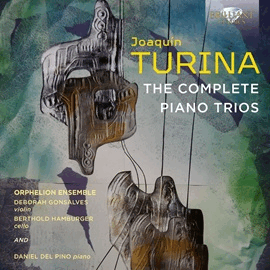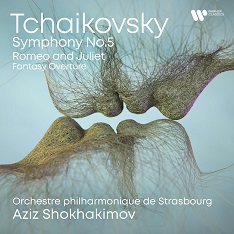Der usbekische Dirigent Aziz Shokhakimov beginnt den ersten Satz der 5. Symphonie von Piotr Tchaikovksy sehr zögernd, mit bedeutsamen Pausen und expressiven Gesten. Das behindert dem Fluss der Musik.
Den weiteren Verlauf des Allegro con anima wird in dieser Interpretation sehr elegant und klingt sehr positiv. Gedanken an das Schicksal oder gar den Tod, wie sie Manfred Honeck oder Dmitrij Kitajenko hörbar machen, werden überspielt.
Sehr gut gelungen ist der Beginn des zweiten Satzes mit dem hoffnungsvollen und hier fast zärtlichen Hornsolo. Auch die organische Verbindung der Melodien des Satzes und ein subtiles Rubato lassen die Musik attraktiv werden.
Der schön gespielte und rhythmisch fein differenzierte Walzer führt zum Finale mit seinen tänzerischen Elementen, die Shokhakimov virtuos und zum Teil sehr drängend spielen lässt und effektvoll mit den entweder elegischen oder geradewegs düsteren Passagen kontrastiert.
Die Romeo und Julia-Ouvertüre wird in dieser Interpretation auffallend transparent im Klang, was Tchaikovskys Orchestrierungskunst beeindruckend deutlich werden lässt. Aziz Shokhakimov gibt jedem der Themen, Pater Lorenzos Rolle, der Konflikt zwischen den verfeindeten Familien und die Liebe zwischen den beiden jungen Leuten die richtige Bedeutung, und so gelingt ihm eine sehr gute und leidenschaftliche Interpretation der Fantasieouvertüre.
Uzbek conductor Aziz Shokhakimov begins the first movement of Piotr Tchaikovksy’s 5th Symphony very hesitantly, with significant pauses and expressive gestures. This hinders the flow of the music.
The rest of the Allegro con anima becomes very elegant in this interpretation and sounds very positive. Thoughts of fate or even death, as Manfred Honeck or Dmitrij Kitajenko make audible, are overplayed.
Very well done is the beginning of the second movement with the hopeful and here almost tender horn solo. The organic connection of the movement’s melodies and a subtle rubato also make the music attractive.
The beautifully played and rhythmically finely differentiated waltz leads to the finale with its dance-like elements, which Shokhakimov allows to be played virtuosically and sometimes very urgently, contrasting effectively with the either elegiac or straightforwardly somber passages.
The Romeo and Juliet Overture becomes strikingly transparent in sound in this interpretation, which makes Tchaikovsky’s orchestration skills impressively clear. Aziz Shokhakimov gives proper meaning to each of the themes, Father Lorenzo’s role, the conflict between the hostile families, and the love between the two young people, and thus he succeeds in a very good and passionate interpretation of the fantasy overture.


















